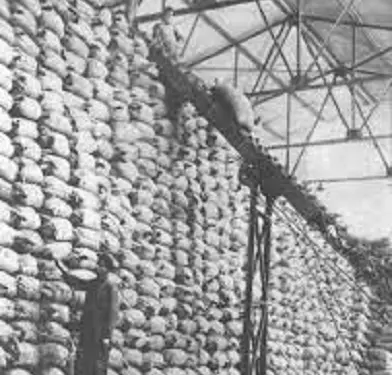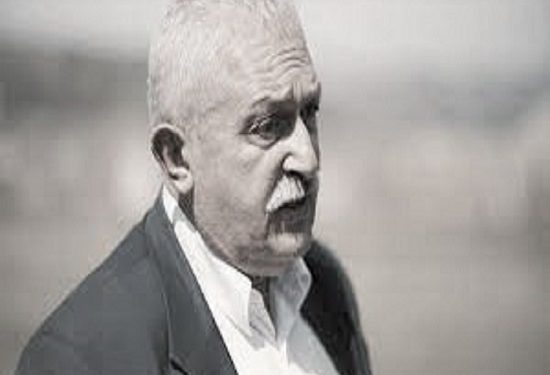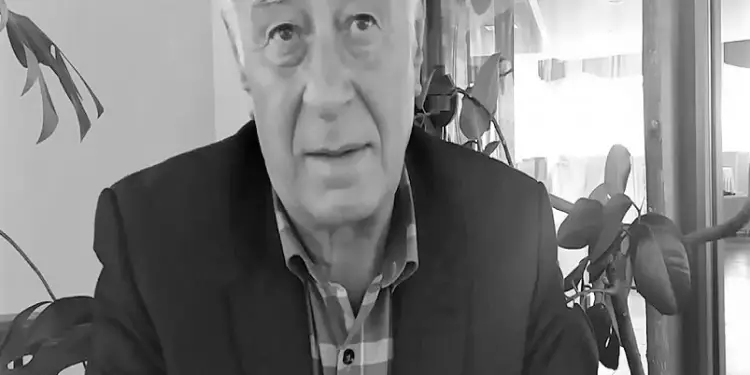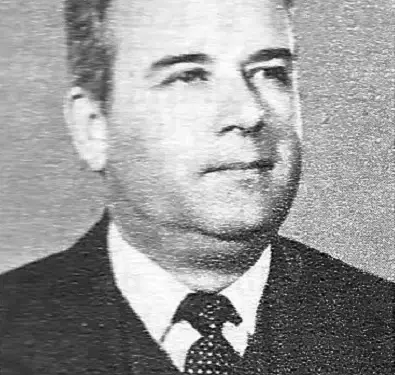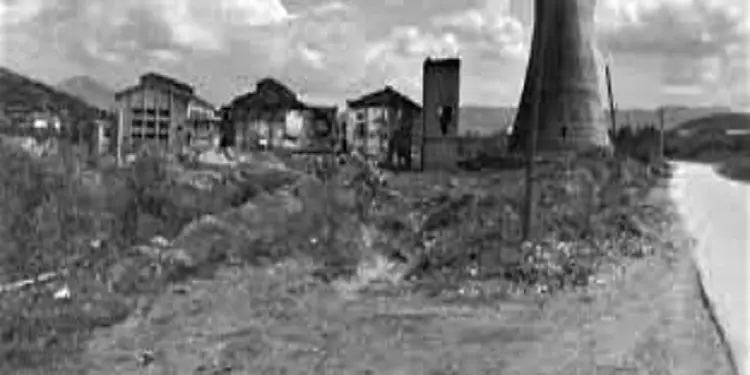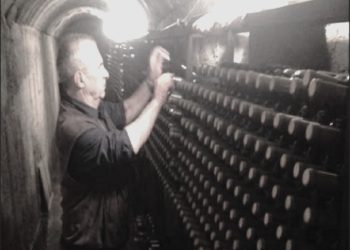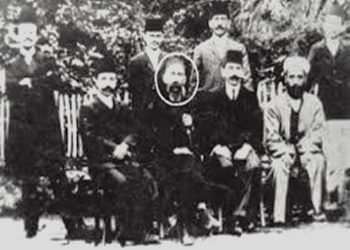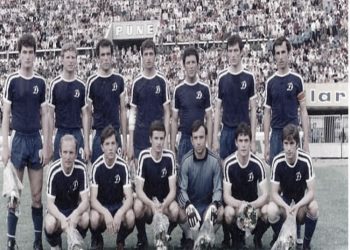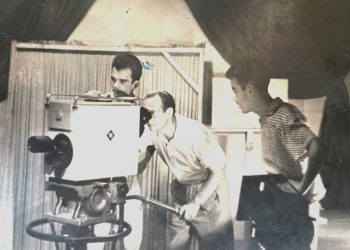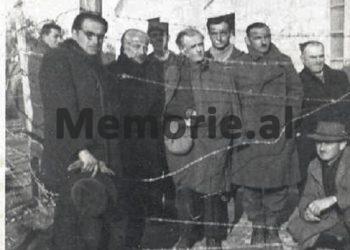By Marcel Hila
Memorie.al/ Ill-treatment in prisons and crimes of communism. Testimony of Petrit Bazelli, a former political prisoner in Spaç and Qafë Bari, who was arrested in December 1980 on charges of agitation and propaganda and sentenced to 10 years in prison. He served his sentence in the prisons of Spaç and Qafë Barit, where as a prisoner he worked in the mine. He was released in 1987, receiving a reduced sentence from the amnesty of that time.
False witnesses who were used in the trial never apologized. When he was arrested, the little boy was left 2-months old, but after he was imprisoned, the little boy was visited by a doctor and told that the child was ill, so he had to be hospitalized. A few days later, his wife, who went to the hospital to feed the baby, noticed three punctures in her spine. From that time on, the child remained undeveloped, in infancy: neither walked nor spoke ever!
Today he is treated with the status of a paraplegic-tetraplegic person. In the years of democracy, Petrit worked as a director in Korça Prison. A director of the Tirana Prosecutor’s Office came to the institution for work and Petriti came face to face with his former investigator, who had once questioned the investigator and prepared the file for his imprisonment. Petrit Bazelli is currently retired and he says: “The prison had nothing to do with me. “I was not physically injured, but my son was left with an open wound at home.”
Welcome, Mr. Petrit! Thank you very much for agreeing to give this interview to us, to bring to light your family’s sufferings, like the thousands of Albanian families that were hit by the dictatorship. What can you tell us about the circumstances and reasons in which you were arrested and convicted?
I was arrested on December 16, 1980, as soon as I quit my job at the Sugar Factory in Maliq, on charges of agitation and propaganda. The investigation took place in Korça and ended in May 1981. I was sentenced to 10 years in prison and taken to Spaç prison.
After 4 days I started working in the mine as a miner until 1983, then we who were able to work, transferred us to Qafë i Barit, to work in the mine. I worked there for up to 1 month before I was released.
From the amount of work in the mine we benefited from a reduction of the sentence by a few days, 3-4 days, according to the calculations performed in prison.
I was released from prison on October 30, 1987, because I benefited from 2 amnesties that were granted. After I was released, I started working on agricultural farms because no one would let me work in the profession, anywhere except in agriculture.
In the years of democracy, I worked in the State Police, until I retired in 2014 because I turned 65 years old.
Are you aware of deaths in prisons where you have been? How the bodies of those who passed away were treated? Where were they buried and how?
In prison, we worked in the mine and there was not a year without the death of 3-4 people who occupied the mine. Once, I too was endangered by the pyrite wagon when I was in the Qafë Barit prison, but I escaped well: I broke only one finger that climbed up and healed. For the victims or other dead, we did not know where they were buried. We knew they were buried somewhere, but where, no!
They had their maps of the places and did not put up signs to indicate that the “X” was here, so that when the time came, they would look for them. No one knew where the burial place was, they did not know.
Do you know how many people may have died in Qafë i Barit and Spaç, while working?
Every year the gallery occupied 3-4 people, but if we did not find out, they were buried.
With a simple account, just during the time you have been there, for 7 years, at least 21-28 people may have died.
Qafë Barit prison was a small prison, with 700-800 people, and we managed to find out when there was a death at work, while in Spaç prison, we could not find out, because we were 1400-1500 people and we worked with 3 tours.
We only knew those we had in the work brigade, we could not know the others except when we had someone from the circle of acquaintances. In Spaç, you could not know anyone.
We worked in places that were not allowed by law. The policeman guarding us also said that. The gallery collapsed and took them inside, but we had to work, to realize the norm, otherwise, if we did not do the norm, then we had to go and eat bread and return with the next shift, until the norm was made. We were burning pyrite acids…!
I want to ask you two questions of a human and emotional nature: Did you meet those who sued you, or those who convicted you?
I do not know who did them; I only know those who witnessed: the party secretary in the village, the chairman of the Maliqi village council and two others, with whom I had absolutely never spoken. I knew them, but I had not spoken to them.
With the advent of democracy, have you seen those people?
Witnesses were undercover spies. We could have been convinced that this or that was, but we did not talk to them. Do not know!
Anyone who has caused you that harm, now in a democracy has he apologized to you?
No. On the contrary, one, with whom we had worked together for 3-4 years in education and who was fired for not fulfilling the conditions, then got a captain and started working in the military unit, when I got out of prison, he changed his route, he did not want to confront, but even his colleagues had learned that he was a spy. He then killed two officers who decided to fire him, killing himself as well. Another has died.
That is, none of them repented, did not feel remorse for what they had done?
Absolutely not! They were afraid, they did not go out on the street, and they changed the way…! But they also fled with many.
What about your family, did anything happen when you went to jail?
When I went to prison, it was two and a half months since my baby was born. I had a maid and three sons. When I was arrested, the little boy was 2 months and 16 days old. While I was at the investigator, I did my best and informed them to be careful of two people. But then I found out that a car, supposedly of health, but in fact was with the doctors of the Internal Affairs Branch, took my little boy.
They had gone to the kindergarten in the village of Maliq, ostensibly to visit the children, and asked about the number of children. There they had learned that there were three newborn children who had been born together with my son, but my son was at home, that the woman, as a teacher, was on maternity leave.
They called my wife, that the boy should have a health check. The woman goes with the little boy; they visit him and tell him that he was ill, so he had to be hospitalized.
After a few days, the woman goes to breastfeed in the morning and sees the boy as dead. Shouts and quarrels with the nurses. “No, we do not know anything! We were notifying parents by phone. The doctor did it”! They said. “We saw him when we changed the child, who had three holes in his spine.”
My parents, brothers, went there. The woman shouted, “What did you do to the boy?” and in the ensuing rage had caught a hair nurse. They say: “We know not. The doctor”! Vangjel Çërrava’s wife was a doctor. Vangjel Çërrava was taken there by Enver to the Central Committee.
He was a member of the Politburo.
Yes, his wife was a doctor. He had also taken marrow from three other children. Two were maimed, one had died.
The prison had nothing to do with me. I went in and out 7 years older. Physically, I did not suffer any injuries to remain crippled. My son was crippled. It’s a pity my wife too.
Is your son alive or dead?
Alive! He is 40 years old, 41 even, but he has remained, it is a pity to say, we have him at home as a coffin discovered. He lives, but does not walk or speak. We hospitalized him many times, until he was finally taken to the camp with paraplegic-tetraplegic status.
After being put in jail, the woman could not stay home. He went to his parents until I was released from prison. But after democracy, the boys ran away, I got married. Now I have this at home, neither talking, nor communicating, nor walking. His mother removes him, because he takes him out in a wheelchair, because he wants to go out, but he does not speak. Can speak 20 words.
Because a big wound.
This is our greatest wound, because the prison had nothing to do with us.
One last question: Have you thought of taking revenge on them?
Absolutely not! We left it to justice, to enforce the law, because we thought it would be done quickly and the witnesses, the spies, would answer, but this work went away. Thirty years have passed and they will not come out. I was the director of the Korça prison, when three people came from the Tirana Prosecutor’s Office. From the glass I saw a face. U?! I shook my head.
To be this, right? I got their names. First, the name of my investigator!
Then I thought of taking him and putting him in jail and beating him and doing to him as he did to me in the time of the investigator, and watching the whole prison. The Korça prison was four hectares. Inside were two buildings, one for regular security and one for high security.
I did not do that job, because I did not want to be ashamed, I would shame the state. Then I told them we were in charge and let them come from Monday onwards. They talked to each other and told me that it was done with two. I accepted and gave the other two names. I did not put him inside; it seemed to me as if I was offending the state.
Thank you so much for the interview!
Thank you very much Mr. Marcel and I wish you long life with healthy families! Memorie.al




